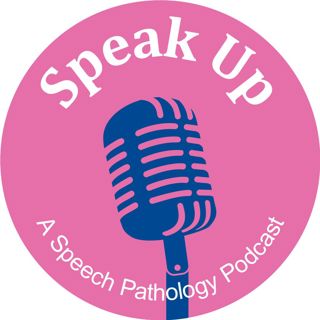
Supporting the mental health needs of people with aphasia - S03 E35
In this week’s episode, Leah Paice, from the Vic Branch Professional Education committee, chats with Dr. Caroline Baker, postdoctoral research fellow at the Aphasia CRE and Research and Clinical Practice Lead in the Speech Pathology Department at Monash Health. Caroline speaks about the mental health considerations when working with a person with aphasia. To request the reference list mentioned in this episode please use the following email address: speakuppodcast@speechpathologyaustralia.org.au Speech Pathology Australia acknowledges the Traditional Custodians of lands, seas and waters throughout Australia, and pay respect to Elders past, present and future. We recognise that the health and social and emotional wellbeing of Aboriginal and Torres Strait Islander peoples are grounded in continued connection to culture, country, language and community.
22 Sep 202129min

Using Telepractice to complete standardised paediatric assessments - S03 E34
In this week’s episode, SPA’s Anneke Flinn chats to Nicki Joshua, Research Director at Pearson Clinical. Nicki explores the key considerations involved in completing a standardised paediatric assessment using Telepractice. Speech Pathology Australia acknowledges the Traditional Custodians of lands, seas and waters throughout Australia, and pay respect to Elders past, present and future. We recognise that the health and social and emotional wellbeing of Aboriginal and Torres Strait Islander peoples are grounded in continued connection to culture, country, language and community.
15 Sep 202127min

Being a new graduate – a panel discussion - S03 E33
In this week’s episode, SPA’s Anneke Flinn hosts a panel discussion with four of our newest Speech Pathologists – Mikayla Power, Elisha Bullen, Luke Oldmeadow and Bonnie Lang. Mikayla, Elisha, Luke and Bonnie explore their experiences with getting their first job, supervision, case allocation and burn out, and give their tips to next year’s new graduates. Speech Pathology Australia acknowledges the Traditional Custodians of lands, seas and waters throughout Australia, and pay respect to Elders past, present and future. We recognise that the health and social and emotional wellbeing of Aboriginal and Torres Strait Islander peoples are grounded in continued connection to culture, country, language and community.
8 Sep 202144min

Speech Pathology in an integrated ENT “First Point of Contact” model - S03 E32
In this week’s episode, SPA’s Adult and Aged Care Project Officer, Nikki Gearon, speaks with Jennifer Davis, Speech Pathologist and Advanced Allied Health Practitioner, from the Integrated Specialist ENT Service at Logan Hospital and Australian Catholic University. Jennifer talks about the speech pathology role in a “First Point of Contact” clinical model in an integrated ENT service. Speech Pathology Australia acknowledges the Traditional Custodians of lands, seas and waters throughout Australia, and pay respect to Elders past, present and future. We recognise that the health and social and emotional wellbeing of Aboriginal and Torres Strait Islander peoples are grounded in continued connection to culture, country, language and community. Disclaimer: © (2024) The Speech Pathology Association of Australia Limited. All rights reserved. Important Notice, Please read: The views expressed in this presentation and reproduced in these materials are not necessarily the views of, or endorsed by, The Speech Pathology Association of Australia Limited (“the Association”). The Association makes no warranty or representation in relation to the content, currency or accuracy of any of the materials comprised in this recording. The Association expressly disclaims any and all liability (including liability for negligence) in respect of use of these materials and the information contained within them. The Association recommends you seek independent professional advice prior to making any decision involving matters outlined in this recording including in any of the materials referred to or otherwise incorporated into this recording. Except as otherwise stated, copyright and all other intellectual property rights comprised in the presentation and these materials, remain the exclusive property of the Association. Except with the Association’s prior written approval you must not, in whole or part, reproduce, modify, adapt, distribute, publish or electronically communicate (including by online means) this recording or any of these materials.
1 Sep 202136min

Communication is everyone’s right - S03 E31
Happy Speech Pathology Week! In this week’s episode, SPA’s Anneke Flinn explores this year’s Speech Pathology Week theme, “Communication is everyone’s right” with Professor Sharynne McLeod, from Charles Sturt University. Sharynne would like to extend her gratitude to Gail Mulcair (SPA CEO), Gaenor Dixon (2019 SPA President), Belinda Hill (2019 SPA Vice President) and Jess McLeod for sharing her UN journey. To view the Speech Pathology Australia “Speak Up for Communication Rights” page referred to in this episode please use the following link: https://www.speechpathologyaustralia.org.au/SPAweb/whats_on/Speak_Up_for_Communication_Rights/SPAweb/What_s_On/Speak_Up_for_Communication_Rights/Speak_Up_for_Communication_Rights.aspx?hkey=411a246a-f554-490b-87fa-d4796160be91 Speech Pathology Australia acknowledges the Traditional Custodians of lands, seas and waters throughout Australia, and pay respect to Elders past, present and future. We recognise that the health and social and emotional wellbeing of Aboriginal and Torres Strait Islander peoples are grounded in continued connection to culture, country, language and community. Disclaimer: © (2024) The Speech Pathology Association of Australia Limited. All rights reserved. Important Notice, Please read: The views expressed in this presentation and reproduced in these materials are not necessarily the views of, or endorsed by, The Speech Pathology Association of Australia Limited (“the Association”). The Association makes no warranty or representation in relation to the content, currency or accuracy of any of the materials comprised in this recording. The Association expressly disclaims any and all liability (including liability for negligence) in respect of use of these materials and the information contained within them. The Association recommends you seek independent professional advice prior to making any decision involving matters outlined in this recording including in any of the materials referred to or otherwise incorporated into this recording. Except as otherwise stated, copyright and all other intellectual property rights comprised in the presentation and these materials, remain the exclusive property of the Association. Except with the Association’s prior written approval you must not, in whole or part, reproduce, modify, adapt, distribute, publish or electronically communicate (including by online means) this recording or any of these materials.
25 Aug 202132min

The Shape Coding system - S03 E30
In this week’s episode, SPA’s Anneke Flinn chats with Dr Susan Ebbels, Speech Therapist and Director of the Research and Training Institute at Moor House School and College, UK. Susan speaks about her intervention approach for school aged children and young people with a Developmental Language Disorder - the Shape Coding System. The DLD self-paced learning package mentioned in this episode can be located on the Learning Hub on the Speech Pathology Australia website. Speech Pathology Australia acknowledges the Traditional Custodians of lands, seas and waters throughout Australia, and pay respect to Elders past, present and future. We recognise that the health and social and emotional wellbeing of Aboriginal and Torres Strait Islander peoples are grounded in continued connection to culture, country, language and community. Disclaimer: © (2024) The Speech Pathology Association of Australia Limited. All rights reserved. Important Notice, Please read: The views expressed in this presentation and reproduced in these materials are not necessarily the views of, or endorsed by, The Speech Pathology Association of Australia Limited (“the Association”). The Association makes no warranty or representation in relation to the content, currency or accuracy of any of the materials comprised in this recording. The Association expressly disclaims any and all liability (including liability for negligence) in respect of use of these materials and the information contained within them. The Association recommends you seek independent professional advice prior to making any decision involving matters outlined in this recording including in any of the materials referred to or otherwise incorporated into this recording. Except as otherwise stated, copyright and all other intellectual property rights comprised in the presentation and these materials, remain the exclusive property of the Association. Except with the Association’s prior written approval you must not, in whole or part, reproduce, modify, adapt, distribute, publish or electronically communicate (including by online means) this recording or any of these materials.
18 Aug 202118min

Voice banking in MND - S03 E29
In this week’s episode, Matt Ernst, Queensland Principal Clinician for Speech Pathology at Better Rehab, speaks with Rob Wong, from Control Bionics, about using voice banking with people with MND. Speech Pathology Australia acknowledges the Traditional Custodians of lands, seas and waters throughout Australia, and pay respect to Elders past, present and future. We recognise that the health and social and emotional wellbeing of Aboriginal and Torres Strait Islander peoples are grounded in continued connection to culture, country, language and community. Disclaimer: © (2024) The Speech Pathology Association of Australia Limited. All rights reserved. Important Notice, Please read: The views expressed in this presentation and reproduced in these materials are not necessarily the views of, or endorsed by, The Speech Pathology Association of Australia Limited (“the Association”). The Association makes no warranty or representation in relation to the content, currency or accuracy of any of the materials comprised in this recording. The Association expressly disclaims any and all liability (including liability for negligence) in respect of use of these materials and the information contained within them. The Association recommends you seek independent professional advice prior to making any decision involving matters outlined in this recording including in any of the materials referred to or otherwise incorporated into this recording. Except as otherwise stated, copyright and all other intellectual property rights comprised in the presentation and these materials, remain the exclusive property of the Association. Except with the Association’s prior written approval you must not, in whole or part, reproduce, modify, adapt, distribute, publish or electronically communicate (including by online means) this recording or any of these materials.
11 Aug 202113min

Seeing is believing – video based intervention - S03 E28
In this week’s episode, SPA’s Anneke Flinn chats to Dr Abi Thirumanickam, lecturer in the School of Allied Health Science and Practice at the University of Adelaide. Abi speaks about using video based intervention with adolescents and adults with an Autism Spectrum Disorder. Speech Pathology Australia acknowledges the Traditional Custodians of lands, seas and waters throughout Australia, and pay respect to Elders past, present and future. We recognise that the health and social and emotional wellbeing of Aboriginal and Torres Strait Islander peoples are grounded in continued connection to culture, country, language and community. Disclaimer: © (2024) The Speech Pathology Association of Australia Limited. All rights reserved. Important Notice, Please read: The views expressed in this presentation and reproduced in these materials are not necessarily the views of, or endorsed by, The Speech Pathology Association of Australia Limited (“the Association”). The Association makes no warranty or representation in relation to the content, currency or accuracy of any of the materials comprised in this recording. The Association expressly disclaims any and all liability (including liability for negligence) in respect of use of these materials and the information contained within them. The Association recommends you seek independent professional advice prior to making any decision involving matters outlined in this recording including in any of the materials referred to or otherwise incorporated into this recording. Except as otherwise stated, copyright and all other intellectual property rights comprised in the presentation and these materials, remain the exclusive property of the Association. Except with the Association’s prior written approval you must not, in whole or part, reproduce, modify, adapt, distribute, publish or electronically communicate (including by online means) this recording or any of these materials.
4 Aug 202121min





















